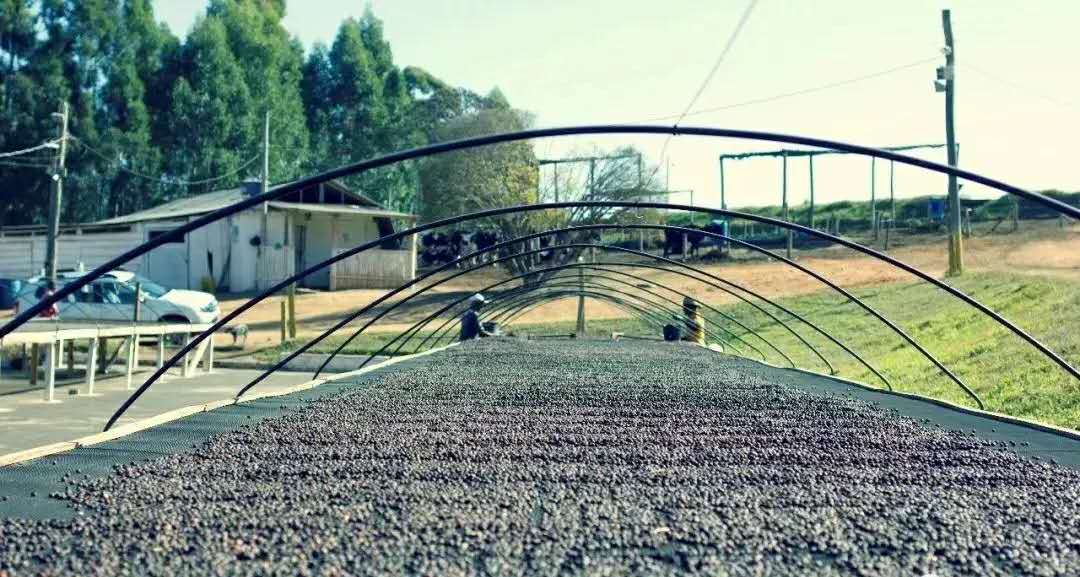Where does the sweetness of coffee come from? why is sun treatment sweeter than washing?

Sun-treated coffee is usually sweeter and more mellow than water-washed coffee and usually has a unique fruity flavor. Intuitively, the sweetness, taste and flavor of sun-treated coffee should come from prolonged contact with the sugary, sticky pulp of coffee fruit-but is there any evidence to prove it? If not, what will happen?
Is natural coffee high in sugar?
The main form of sugar in coffee beans is sucrose, accounting for 5-9% of the seeds and more than 90% of the total sugar content. We found that the amount of sucrose does not change with different treatment methods, but depends on the growth pattern of coffee. However, sun-treated raw beans do contain more fructose and glucose than fully washed ones, so they do contain slightly more sugar overall, while honey treatment is somewhere in between.
But if the sugar in the flesh can pass through parchment into the seeds of dried fruit, why hasn't this happened to the trees? Since most of the sugar itself is destroyed during baking, where does the added sweetness come from?
We know that untreated coffee beans also have higher levels of fructose and glucose than raw coffee beans that have been washed. This means that in the process of processing coffee beans, it is not the sugar content that increases, but the sugar content in washed coffee actually decreases.
Why does washed coffee contain less sugar?
As part of the washing process, beans are soaked in water for a period of time, so early studies have shown that sugar can be dissolved in water. Since then, however, the same changes have taken place in mechanically washed coffee and drying beds, so water is not the culprit. Instead, the researchers found that coffee seeds began to sprout. This process consumes the sugar stored in the seeds, first consuming the simplest sugars (glucose and fructose). In addition to affecting the level of sucrose, the germination of washed coffee will also increase the concentration of some amino acids in seeds. Amino acids are the most important aroma precursors in green coffee, so this helps to discover the complexity of aroma in washed coffee.
Why do only washed coffee seeds sprout?
Coffee seeds are almost always ready to germinate. Unlike other seeds, they have no dormant period, such as when they are dry. This is one of the reasons why it is so difficult to store coffee seeds in seed banks; instead, coffee varieties must be kept in live collectibles. When the seed is still in the fruit, something in the pulp, whether plant hormones or water, prevents the seed from germinating. However, during fermentation, once the pulp is removed, the metabolism of the seed begins to change in preparation for germination. In naturally processed coffee, the pulp inhibits seed germination until the coffee cherry is dry, when the metabolism of the seed stops completely. This preserves the sugar content in the seeds.
What gives the sweetness and fruit aroma of natural coffee?
Although it is now clear that almost no sugar enters the seeds during raw bean treatment, it seems that some compounds are absorbed by the seeds. These come not from the aroma of the fruit itself, but from volatile compounds, especially esters, which are produced by microbes when the fruit begins to ferment. Unlike most of the volatile compounds found in untreated raw beans, these compounds retain after roasting and bring floral and fruity aromas to roasted coffee.
Some of these esters, such as ethyl butyrate, also help to sense sweetness. Although most sugars are destroyed during baking, they are also important precursors of many aromatic molecules produced during caramelization, such as furans, which also makes naturally processed coffee look sweeter.
Important Notice :
前街咖啡 FrontStreet Coffee has moved to new addredd:
FrontStreet Coffee Address: 315,Donghua East Road,GuangZhou
Tel:020 38364473
- Prev

Espresso | what is the effect of changing the water temperature of the Italian machine on espresso
Decades of trial and error have shown that most people prefer to use 85-95C water to make espresso. For lighter roasted coffee, the temperature range is usually narrower than 90-95C. However, in this small range, there are still quite a lot of taste differences to be explored. The higher the temperature, the lighter the sweetness of the coffee and the stronger the acidity; the lower the temperature can reduce the scorching taste when roasting, otherwise the coffee will be more acidic.
- Next

How does the pressure change of espresso machine affect the quality of coffee
The key to espresso is pressure, and the crema, weight and flavor of espresso all come from the influence of pressure. But why is stress so important? How does it affect concentrated formulations? Why is nine atmospheres the most commonly recommended pressure setting for brewing coffee? I believe everyone has some questions about stress. The author interviewed Stephen Kim of Cafflano, and Caf
Related
- What is the meaning of lactic acid fermentation with coffee bean treatment?
- How to judge the state of foam by sound?
- How does the latte pull out the unicorn pattern? Come to get for a little trick to improve the flower pull!
- Will flower pulling affect the taste of the latte?
- Do you know the history of coffee?
- The difference between honey treatment and sun washing what is raisin honey treatment?
- What kind of milk can a novice use to make coffee foam to keep the foam longer? The correct method and skills of milking tutorial sharing
- Why do washed coffee beans taste sour? Flavor characteristics of washed Coffee
- Introduction to the skill of how to practice the size and height of water injection around the circle of hand-brewed coffee
- How do beginners practice coffee flower drawing from scratch?

